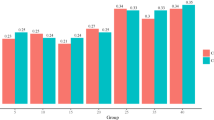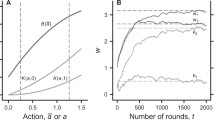Abstract
A growing body of literature in experimental economics examines how cognitive ability affects cooperation in social dilemma settings. We contribute to the existing literature by studying this relationship in a more complex and strategic environment when the number of partners increases in an infinitely repeated public goods game. We designed four treatments with different continuation probability under two conditions: whether cooperation can be sustained as risk dominance or not. We asked participants to decide whether to cooperate in every period in the first five rounds. They were further asked to decide if they should elicit their strategy at the beginning of each super game using the strategy method in the last five rounds. We found that participants with greater cognitive abilities cooperated more (less) when cooperation could (not) be sustained as risk dominance. A similar trend was observed in the frequency of fully cooperative strategies. We also found that participants with greater cognitive abilities employed lenient and forgiving strategies more frequently when the continuation probability was far higher than the risk dominant threshold level.




Similar content being viewed by others
Availability of data and materials
Supplementary material is available at journal’s website.
Notes
Players using GRIM will cooperate if all partners cooperate; otherwise, they defect.
The procedure for calculating the threshold value of continuation probability for GRIM to be supported as an RDE is shown in Appendix A.
The strategy method for infinitely repeated games was introduced by Selten (1967). Vespa (2020) extended the strategy method into a one-period-ahead strategy method, and Romero and Rosokha (2018) introduced the constructing strategy method. There is still no evidence that players employ strategies beyond two-period-ahead histories (or above) in infinitely repeated PG games. Hence, to reduce players’ difficulty in eliciting strategies, we used the one-period-ahead strategy method to investigate the one-period-ahead history strategies in an infinitely repeated PG game following Dal Bó and Fréchette (2019) and Vespa (2020).
The 16 selected questions are commonly used in Japan and Europe (see Hanaki et al. 2016) These 16 questions are selected from all 48 questions, arranged from easy to difficult.
We report the results of experimental data from the strategy method (rounds 6 to 10) in Table A12 in Appendix D.
We also conducted the unconditional logistic regression of cooperation rate, with HCA participants as the dummy independent variable, without controlling for demographic variables and robust standard errors clustered by group. The results are illustrated in Table A18 and Table A20 in Appendix E.
All regression results are illustrated in Table A11 and A13 in Appendix D.
In the results of the unconditional logistic regression (i.e., without controlling demographic variables), in the strategy method (simulation) in Treatment 2, the average cooperation rate of HCA participants and LCA participants were not statistically significant in period 1 (HCA: 21% and LCA: 22%) and all periods (HCA: 17% and LCA: 17%).
In the results of the unconditional logistic regression (i.e., without controlling demographic variables), in the strategy method (simulation) in Treatment 3, the average cooperation rate of HCA participants is higher than that of LCA participants in both period 1 (HCA: 44% and LCA:39%) and all periods (HCA: 22% and LCA: 20%) with statistically significant.
In the results of unconditional logistic regression (i.e., without controlling demographic variables), in the strategy method (simulation) in Treatment 4, the average cooperation rate of HCA participants and LCA participants were not statistically significant in period 1 (HCA: 46% and LCA: 41%) and all periods (HCA: 27% and LCA: 19%).
We also conducted an unconditional logistic regression of strategy types, with HCA participants as the dummy independent variable, without controlling for demographic variables and robust standard errors. The results are illustrated in Table A21 to A23 in Appendix E.
All regression results are illustrated in Table A14 to A16 in Appendix D.
In the results of unconditional logistic regression (i.e., without controlling demographic variables), in Treatment 4, the frequency of fully cooperative strategies among HCA participants and LCA participants was not statistically significant (HCA: 31% and LCA: 18%).
References
Al-Ubaydli O, Jones G, Weel J (2016) Average player traits as predictors of cooperation in a repeated prisoner’s dilemma. J Behav Exp Econ 64:50–60
Aoyagi M, Bhaskar V, Fréchette GR (2019) The impact of monitoring in infinitely repeated games: perfect, public, and private. Am Econ J Microecon 11(1):1–43
Barreda-Tarrazona I, Jaramillo-Gutiérrez A, Pavan M, Sabater-Grande G (2017) Individual characteristics vs. experience: an experimental study on cooperation in prisoner’s dilemma. Front Psychol 8:596
Bigoni M, Casari M, Skrzypacz A, Spagnolo G (2015) Time horizon and cooperation in continuous time. Econometrica 83(2):587–616
Blonski M, Ockenfels P, Spagnolo G (2011) Equilibrium selection in the repeated prisoner’s dilemma: axiomatic approach and experimental evidence. Am Econ J Microecon 3(3):164–92
Brañas-Garza P, García-Muñoz T, González RH (2012) Cognitive effort in the beauty contest game. J Econ Behav Org 83(2):254–260
Carlsson H, Van Damme E (1993) Equilibrium selection in stag hunt games. Frontiers of game theory 237
Carpenter J, Graham M, Wolf J (2013) Cognitive ability and strategic sophistication. Games Econ Behav 80:115–130
Dal Bó P, Fréchette GR (2011) The evolution of cooperation in infinitely repeated games: experimental evidence. Am Econ Rev 101(1):411–29
Dal Bó P, Fréchette GR (2019) Strategy choice in the infinitely repeated prisoner’s dilemma. Am Econ Rev 109(11):3929–52
Dreber A, Fudenberg D, Rand DG (2014) Who cooperates in repeated games: the role of altruism, inequity aversion, and demographics. J Econ Behav Org 98:41–55
Duffy J, Ochs J (2009) Cooperative behavior and the frequency of social interaction. Games Econom Behav 66(2):785–812
Fischbacher U (2007) z-tree: Zurich toolbox for ready-made economic experiments. Exp Econ 10(2):171–178
Fréchette GR, Yuksel S (2017) Infinitely repeated games in the laboratory: four perspectives on discounting and random termination. Exp Econ 20(2):279–308
Fudenberg D, Rand DG, Dreber A (2012) Slow to anger and fast to forgive: cooperation in an uncertain world. Am Econ Rev 102(2):720–749
Gill D, Prowse V (2016) Cognitive ability, character skills, and learning to play equilibrium: a level-k analysis. J Polit Econ 124(6):1619–1676
Hanaki N, Jacquemet N, Luchini S, Zylbersztejn A (2016) Fluid intelligence and cognitive re ection in a strategic environment: evidence from dominance-solvable games. Front Psychol 7:1188
Harsanyi JC, Selten R et al (1988) A general theory of equilibrium selection in games. MIT Press Books, 1
Jones G (2008) Are smarter groups more cooperative? Evidence from prisoner’s dilemma experiments, 1959–2003. J Econ Behav Org 68(3–4):489–497
Kawamura T, Ogawa K (2019) Cognitive ability and human behavior in experimental ultimatum games. Res Econ 73(1):97–106
Kim Y (1996) Equilibrium selection inn-person coordination games. Games Econom Behav 15(2):203–227
Lugovskyy V, Puzzello D, Sorensen A, Walker J, Williams A (2017) An experimental study of finitely and infinitely repeated linear public goods games. Games Econom Behav 102:286–302
Palfrey TR, Rosenthal H (1994) Repeated play, cooperation and coordination: an experimental study. Rev Econ Stud 61(3):545–565
Proto E, Rustichini A, Sofianos A (2019) Intelligence, personality, and gains from cooperation in repeated interactions. J Polit Econ 127(3):1351–1390
Raven JC (1936) Mental tests used in genetic studies: The performance of related individuals on tests mainly educative and mainly reproductive. Unpublished master’s thesis, University of London
Romero J, Rosokha Y (2018) Constructing strategies in the indefinitely repeated prisoner’s dilemma game. Eur Econ Rev 104:185–219
Sell J, Wilson RK (1999) The maintenance of cooperation: expectations of future interaction and the trigger of group punishment. Soc Forces 77(4):1551–1571
Selten R (1967) Die strategiemethode zur erforschung des engeschraänkt rationalen verhaltens im rahmen eines oligopolexperiments. H. Sauermann (Ed.), Beiträge zuer experimentellen wirtschaftsforschung (pp. 136–168). Tübingen: J. C. B. Mohr
Tan L, Wei L (2014) Voluntary contribution mechanism played over an infinite horizon. Pac Econ Rev 19(3):313–331
Vespa E (2020) An experimental investigation of cooperation in the dynamic common pool game. Int Econ Rev 61(1):417–440
Acknowledgements
We would like to thank the editor, the co-editor, and the anonymous referees. We are grateful to Takanori Ida, Kazuhito Ogawa, Hajime Kobayashi, Tadashi Sekiguchi, Hisaki Kono, Yohei Mitani, Masaki Aoyagi, Nobuyuki Hanaki and Masao Ogaki, as well as the participants at the International Workshop for Lab and Field Experiments and the 21st Experimental Social Sciences Conference, Kansai University for their helpful conversations and comments. We thank the Kansai University Center for Experimental Economics for the use of experimental laboratories and participant recruiting system. Research support was provided by Japan Society for the Promotion of Science KAKENHI Grant Numbers (JP17J03485, JP20H05631). The experiment reported in this paper is approved by Research Ethic Committee at The Research Institute for Socionetwork Strategies (RISS), Kansai University.
Funding
We gratefully acknowledge the financial support from Japan Society for the Promotion of Science KAKENHI Grant Numbers (JP17J03485, JP20H05631).
Author information
Authors and Affiliations
Contributions
The authors contributed equally to this work.
Corresponding author
Ethics declarations
Conflict of interest
The authors declare that they have no conflict of interest.
Ethics approval
The experiment reported in this paper is approved by Research Ethic Committee at The Research Institute for Socionetwork Strategies (RISS), Kansai University.
Consent to participate
All participants signed the consent form to agree to participate this experiment.
Consent for publication
All participants signed the consent form to agree to publish the experimental data under the condition of anonymity.
Code availability
Code used in analysis is available at journal’s website.
Additional information
Publisher's Note
Springer Nature remains neutral with regard to jurisdictional claims in published maps and institutional affiliations.
Supplementary Information
Below is the link to the electronic supplementary material.
Rights and permissions
About this article
Cite this article
Kawamura, T., Tse, T.T.K. Intelligence promotes cooperation in long-term interaction: experimental evidence in infinitely repeated public goods games. J Econ Interact Coord 17, 927–946 (2022). https://doi.org/10.1007/s11403-022-00352-x
Received:
Accepted:
Published:
Issue Date:
DOI: https://doi.org/10.1007/s11403-022-00352-x




